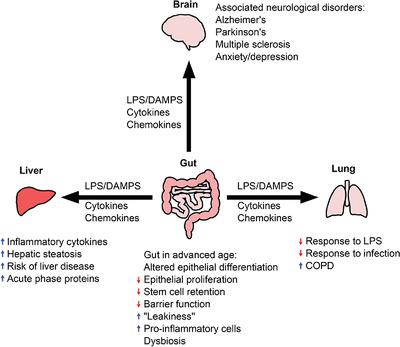当前位置:
X-MOL 学术
›
J. Leukoc. Biol.
›
论文详情
Our official English website, www.x-mol.net, welcomes your
feedback! (Note: you will need to create a separate account there.)
Age-related changes in intestinal immunity and the microbiome
Journal of Leukocyte Biology ( IF 3.6 ) Pub Date : 2020-10-05 , DOI: 10.1002/jlb.3ri0620-405rr Travis Walrath 1 , Kiran U Dyamenahalli 1 , Holly J Hulsebus 1, 2 , Rebecca L McCullough 3, 4 , Juan-Pablo Idrovo 1 , Devin M Boe 1, 2, 5 , Rachel H McMahan 1 , Elizabeth J Kovacs 1, 2, 4, 5
Journal of Leukocyte Biology ( IF 3.6 ) Pub Date : 2020-10-05 , DOI: 10.1002/jlb.3ri0620-405rr Travis Walrath 1 , Kiran U Dyamenahalli 1 , Holly J Hulsebus 1, 2 , Rebecca L McCullough 3, 4 , Juan-Pablo Idrovo 1 , Devin M Boe 1, 2, 5 , Rachel H McMahan 1 , Elizabeth J Kovacs 1, 2, 4, 5
Affiliation

|
The gastrointestinal (GI) tract is a vitally important site for the adsorption of nutrients as well as the education of immune cells. Homeostasis of the gut is maintained by the interplay of the intestinal epithelium, immune cells, luminal Ags, and the intestinal microbiota. The well-being of the gut is intrinsically linked to the overall health of the host, and perturbations to this homeostasis can have severe impacts on local and systemic health. One factor that causes disruptions in gut homeostasis is age, and recent research has elucidated how critical systems within the gut are altered during the aging process. Intestinal stem cell proliferation, epithelial barrier function, the gut microbiota, and the composition of innate and adaptive immune responses are all altered in advanced age. The aging population continues to expand worldwide, a phenomenon referred to as the “Silver Tsunami,” and every effort must be made to understand how best to prevent and treat age-related maladies. Here, recent research about changes observed in the intestinal epithelium, the intestinal immune system, the microbiota, and how the aging gut interacts with and influences other organs such as the liver, lung, and brain are reviewed. Better understanding of these age-related changes and their impact on multi-organ interactions will aid the development of therapies to increase the quality of life for all aged individuals.
中文翻译:

肠道免疫和微生物组的年龄相关变化
胃肠道 (GI) 是吸收营养物质和培养免疫细胞的重要场所。肠道内稳态是通过肠上皮、免疫细胞、腔内抗原和肠道微生物群的相互作用来维持的。肠道的健康与宿主的整体健康有着内在的联系,对这种体内平衡的扰动会对局部和全身健康产生严重影响。导致肠道稳态紊乱的一个因素是年龄,最近的研究已经阐明了肠道内的关键系统在衰老过程中是如何改变的。肠道干细胞增殖、上皮屏障功能、肠道微生物群以及先天性和适应性免疫反应的组成都会随着年龄的增长而改变。全球人口老龄化持续扩大,一种被称为“银色海啸”的现象,必须尽一切努力了解如何最好地预防和治疗与年龄有关的疾病。本文回顾了最近关于肠道上皮细胞、肠道免疫系统、微生物群的变化以及老化肠道如何与肝脏、肺和大脑等其他器官相互作用和影响的研究。更好地了解这些与年龄相关的变化及其对多器官相互作用的影响将有助于开发治疗方法,以提高所有老年人的生活质量。以及老化的肠道如何与肝脏、肺和大脑等其他器官相互作用并对其产生影响。更好地了解这些与年龄相关的变化及其对多器官相互作用的影响将有助于开发治疗方法,以提高所有老年人的生活质量。以及老化的肠道如何与肝脏、肺和大脑等其他器官相互作用并对其产生影响。更好地了解这些与年龄相关的变化及其对多器官相互作用的影响将有助于开发治疗方法,以提高所有老年人的生活质量。
更新日期:2020-10-05
中文翻译:

肠道免疫和微生物组的年龄相关变化
胃肠道 (GI) 是吸收营养物质和培养免疫细胞的重要场所。肠道内稳态是通过肠上皮、免疫细胞、腔内抗原和肠道微生物群的相互作用来维持的。肠道的健康与宿主的整体健康有着内在的联系,对这种体内平衡的扰动会对局部和全身健康产生严重影响。导致肠道稳态紊乱的一个因素是年龄,最近的研究已经阐明了肠道内的关键系统在衰老过程中是如何改变的。肠道干细胞增殖、上皮屏障功能、肠道微生物群以及先天性和适应性免疫反应的组成都会随着年龄的增长而改变。全球人口老龄化持续扩大,一种被称为“银色海啸”的现象,必须尽一切努力了解如何最好地预防和治疗与年龄有关的疾病。本文回顾了最近关于肠道上皮细胞、肠道免疫系统、微生物群的变化以及老化肠道如何与肝脏、肺和大脑等其他器官相互作用和影响的研究。更好地了解这些与年龄相关的变化及其对多器官相互作用的影响将有助于开发治疗方法,以提高所有老年人的生活质量。以及老化的肠道如何与肝脏、肺和大脑等其他器官相互作用并对其产生影响。更好地了解这些与年龄相关的变化及其对多器官相互作用的影响将有助于开发治疗方法,以提高所有老年人的生活质量。以及老化的肠道如何与肝脏、肺和大脑等其他器官相互作用并对其产生影响。更好地了解这些与年龄相关的变化及其对多器官相互作用的影响将有助于开发治疗方法,以提高所有老年人的生活质量。











































 京公网安备 11010802027423号
京公网安备 11010802027423号